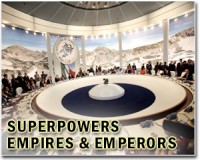 |
Yokohama, Japan (AFP) Nov 15, 2010 While Japan witnessed a thaw in sometimes frosty ties with China and Russia at weekend summits, its diplomatic power is waning in parallel to the erosion of its economic might, analysts say. Prime Minister Naoto Kan, who took office in June, assumed his highest-profile international role to date when he chaired this year's Asia-Pacific Economic Cooperation summit in Yokohama at the weekend. But he did so under the shadow of his party's sobering first 14 months in power marked by tensions with the United States, China and Russia, facing criticism over what is seen at home as his muddled diplomatic efforts. In contrast, analysts say China and Russia have become increasingly assertive against the backdrop of their economic rise, as Japan's international clout wanes along with its weakening economic status. "Both China and Russia are gaining confidence based on their favourable economies" compared with Japan, said Shinichi Nishikawa, professor of politics at Meiji University in Tokyo. A symbol of Japan's waning influence is the plunge in Tokyo's foreign aid pledges since the 1990s as a result of its two decade economic malaise, said Nishikawa. The resource-poor nation faces tough competition from rival China for influence and resources, including minerals and energy from places such as Africa, where Beijing's presence has increased sharply. Japan, eclipsed by China as the world's number two economy, topped the global donors' list in the 1990s but has now fallen to fifth according the foreign ministry. Its foreign aid has plunged by around 40 percent from its peak in 1997 because of budget constraints as it grapples with the industrialised world's biggest debt of around 200 percent of gross domestic product. Kan admitted in comments to reporters at the summit that Japan is no longer "an overwhelming economic power" in the Asia-Pacific region. Charged with helping forge a consensus among the 21 APEC members over the weekend to turn dreams of a free trade zone in the region into reality, separate rows with China and Russia have piled pressure on the premier. The diplomatic woes are yet another headache for an administration dealing with deflation, a shrinking population, a mountain of public debt and the impact of a surging yen on a fragile economic recovery. The feud with Beijing stems from the arrest of a Chinese trawler captain whose vessel collided with Japanese patrol boats in waters near a disputed island chain in the East China Sea in September. Japan said Saturday that Kan detailed his nation's firm stance on the issue, signalling the depth of the discord despite warmer comments from China that the two should "follow a road of peace, friendship and cooperation". Kan then "voiced protest" to Russian President Dmitry Medvedev over his visit this month to the disputed Kuril islands, but the two sides conceded the need for economic cooperation to reach a breakthrough in the row. Yet Kan's apparent progress in improving the relations had little effect at home where his approval ratings have tumbled on the view that an inexperienced government has mishandled the spats. The Asahi Shimbun lamented a "lack of concrete results. Japan's damage-control diplomacy will continue treading on thin ice." Many Asian nations have viewed with alarm China's newly assertive posture on territorial issues this year, and have embraced US efforts to re-engage with the region where it is seen as an important counterbalance. But Japan is still trying to mend ties with Washington that have been damaged by wrangling over the fate of a controversial air base, a long-running dispute that helped topple Yukio Hatoyama, Kan's predecessor. Analysts also say the apparent shift of America's attention to emerging economies allowed China and Russia to catch Japan off its guard and exploit its perceived weakness. "The US is now turning toward China and India at a time when the US base and other Japanese issues have been in standstill," said Tetsuro Kato, professor of international politics at Waseda University in Tokyo. Comments from both sides at APEC underlined efforts to repair the Japan-US relationship. Mitoji Yabunaka, former top diplomat in the nation's foreign ministry, advised Kan to attach more weight to Tokyo's longtime alliance with Washington as a safeguard against giant rivals. "When we confront China, the Japan-US alliance is important," Yabunaka told a television interview. If anything the tensions over the past year were an important lesson for Japan, he added.
Share This Article With Planet Earth
Related Links Learn about the Superpowers of the 21st Century at SpaceWar.com Learn about nuclear weapons doctrine and defense at SpaceWar.com
 Poland satisfied with NATO strategic rethink: minister
Poland satisfied with NATO strategic rethink: ministerWarsaw, Poland (AFP) Nov 13, 2010 Poland is satisfied with NATO's strategic rethink, which alliance leaders are scheduled to sign off on at a summit next week, Defence Minister Bogan Klich said Saturday. "The planned new strategic concept in its current version meets the expectations and interests of Poland," Klich told a session of NATO's parliamentary assembly in Warsaw. The assembly, which brings together 260 lawmaker ... read more |
|
| The content herein, unless otherwise known to be public domain, are Copyright 1995-2010 - SpaceDaily. AFP and UPI Wire Stories are copyright Agence France-Presse and United Press International. ESA Portal Reports are copyright European Space Agency. All NASA sourced material is public domain. Additional copyrights may apply in whole or part to other bona fide parties. Advertising does not imply endorsement,agreement or approval of any opinions, statements or information provided by SpaceDaily on any Web page published or hosted by SpaceDaily. Privacy Statement |